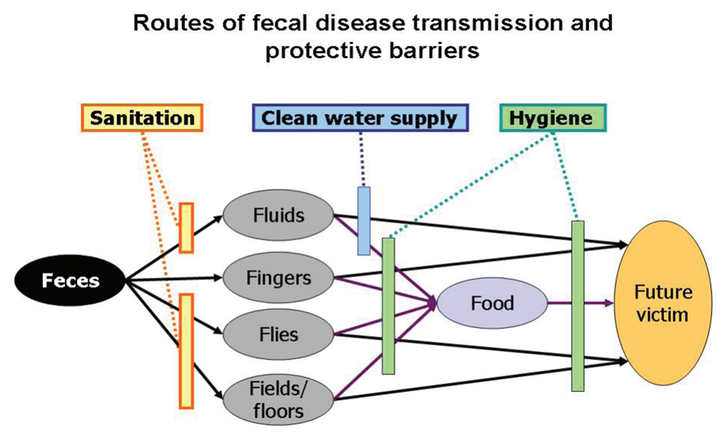Our Blog / Water Facts / Current Page
First, an introduction to viruses in general
This extremely small, infectious agent is considered the ‘most abundant biological entity on the planet’. But something special about these unique microbes is that they can only replicate inside the living cells of another organism. This other organism is commonly known as their ‘host cell’. This characteristic limits where the virus can reproduce, but it doesn’t limit the survival of a virus outside of a host cell. Depending on the virus strain and the surrounding conditions, viruses can remain infectious from 20 minutes to 24 hours once they leave the body. Transmission includes but not limited to: respiratory droplets, fecal matter, contact with hard and soft surfaces, vectors such as mosquitoes and ticks, and WATER. Because of this, it is important to wash your hands regularly, disinfect all surfaces that have been in contact with the virus, protect yourself against vector-transmission, and filter any water that has potentially been contaminated. If you need to check if your drinking water is safe for consumption, read our blog here. Now, let’s see how much you know about virus transmission in water! |
|
Polioviruses Adenovirus Dengue virus Influenza Hepatitis A |
Hepatitis B Rotavirus Norovirus Coxsackieviruses Hepatitis C |
Astrovirus Caliciviruses Enteroviruses Hepatitis E West Nile Virus |
That's true, we left it out because we don't want to make a claim that doesn't have sufficient evidence to support or negate it. Some articles have mentioned that SARS and COVID-19 may have been transmitted to residents on different floors of residential buildings through piping; or that fecal contamination is possible in rare, specific cases. However, the article here suggests that coronaviruses die off rapidly in wastewater and in fecal-shedding, therefore suggesting that fecal-transmission is unlikely. As more studies are undertaken to confirm this, the best action is to create protective barriers against all fecal disease transmission.
 (Sources: Wagner and Lanoix 1959, World Bank Group 2013)
(Sources: Wagner and Lanoix 1959, World Bank Group 2013) 1. B - Microfiltration can filter bacteria but is not small enough to filter viruses
2. A - Temperature, Light, and pH all influence how long a virus can survive in water
3. C - Temperature: the temperature of the water and surrounding conditions have the greatest influence on virus survival. Viruses survive longer in lower temperatures.
4. A - Salt water; B- Fresh water; C- Waste water. Viruses can thrive in these surface waters. Collected Rain Water can contain viruses if it is contaminated during collection or storage.
5. Adenovirus, Astrovirus, Hepatitis A, Hepatitis E, Rotavirus, Norovirus, Coxsackieviruses, Polioviruses, Caliciviruses, and Enteroviruses are all known water born viruses
Now that you know all about waterborne viruses, we hope you'll do your part in spreading the knowledge and safe practices to keep yourself and those around you healthy!
Blog Author: Michelle Falcone
https://en.wikipedia.org/wiki/Human_viruses_in_water
https://www.medicalnewstoday.com/articles/256521#transmission
https://microbiologysociety.org/why-microbiology-matters/what-is-microbiology/viruses.html
https://www.medicalnewstoday.com/articles/158179#viral-diseases
https://www.nhs.uk/common-health-questions/infections/how-long-do-bacteria-and-viruses-live-outside-the-body/
https://www.pbs.org/newshour/science/how-long-do-cold-and-flu-viruses-stay-contagious-on-public-surfaces
https://www.livescience.com/53272-what-is-a-virus.html
https://academic.oup.com/femsre/article/36/4/786/518976
This little step-by-step guide, Thanks for the solution… I was looking for the exact thing ......
It is very good information about some myths regarding the curing of both HIV and hepatitis C infection. It was somewhat useful for many including me. It is a must-read blog to explore the new info about <a href="https://drugcarts.com/product/viraday-tablet"> HIV and hepatitis C infection curable medicines</a>. Keep it posting these kinds of informative blogs in the future!
Great post! Informative and engaging. Thanks for sharing this valuable content <a href=”https://srislaw.com/leyes-de-divorcio-del-estado-de-nueva-york-propiedad-conyugal/”>Leyes de Divorcio del Estado de Nueva York Propiedad Conyugal</a>
Thank for the information, please visit
<a href=https://ittelkom-sby.ac.id/>VisitUs</a>
Leave a Reply.
Want more?

|
|
Thank you for Signing Up |


Water Facts
Blog Archives
August 2022
May 2022
April 2022
July 2020
April 2020
February 2020
December 2019
July 2019
June 2019



.jpg)